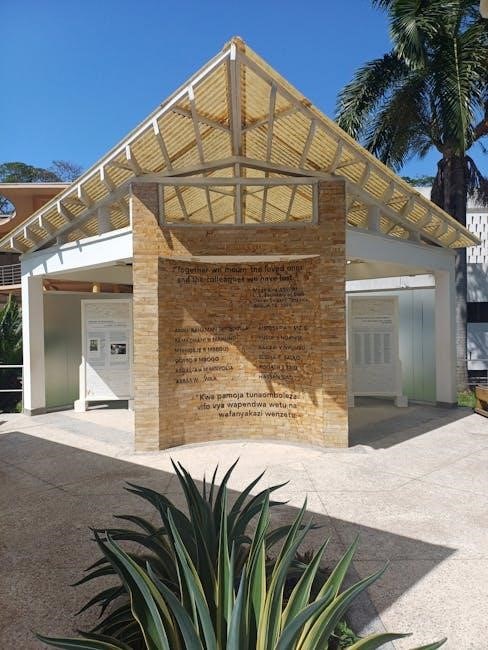The Brief Wondrous Life of Oscar Wao by Junot Díaz is a Pulitzer Prize-winning novel exploring themes of identity, culture, and family history. Its vibrant storytelling and rich cultural depth have made it a landmark of contemporary literature, resonating with readers worldwide.
Overview of “The Brief Wondrous Life of Oscar Wao”
The Brief Wondrous Life of Oscar Wao is a Pulitzer Prize-winning novel by Junot Díaz, blending personal and historical narratives. The story follows Oscar de León, a Dominican-American outsider, as he navigates identity, love, and family curses. The novel weaves magical realism with the harsh realities of dictatorship and migration, exploring themes of cultural identity, intergenerational trauma, and the power of storytelling. Its vibrant prose and unique voice captivate readers, making it a modern literary masterpiece.
Importance of the Novel in Contemporary Literature
The Brief Wondrous Life of Oscar Wao holds significant importance in contemporary literature, winning the Pulitzer Prize in 2008 and ranking among the 100 Best Books of the 21st Century. Its innovative use of Spanglish, footnotes, and blending of myth with reality redefined storytelling. The novel bridges cultural divides, offering a fresh perspective on the Dominican-American experience. Its exploration of identity, migration, and intergenerational trauma resonates universally, making it a landmark work in modern literary history.

Historical and Cultural Context
The Brief Wondrous Life of Oscar Wao is deeply rooted in the history of the Dominican Republic under Rafael Trujillo and the immigrant experience in the U.S., blending cultural identity and political turmoil.
The Dominican Republic Under Rafael Trujillo
The novel vividly portrays the oppressive regime of Rafael Trujillo, who ruled the Dominican Republic with terror and control. Trujillo’s dictatorship is central to the story, as it shapes the lives of Oscar’s family through fear, violence, and repression. The regime’s brutality is highlighted through Abelard Cabral’s experiences, illustrating how Trujillo’s rule led to emigration and intergenerational trauma. The dictator’s shadow looms over the narrative, symbolizing the dark legacy of authoritarianism and its lasting impact on Dominican identity and history.
The Immigrant Experience in the United States
The novel delves into the challenges of Dominican immigrants adapting to life in the United States, particularly in New Jersey. Oscar and his family face cultural dislocation, identity struggles, and the pressures of assimilation. The immigrant experience is marked by a sense of displacement, as characters like Oscar grapple with balancing their Dominican heritage and American surroundings. This duality shapes their struggles with belonging, identity, and the intergenerational trauma carried from their homeland to their new life.

Plot Summary
The story follows Oscar de León, a Dominican American navigating identity, love, and a family curse. Set in New Jersey and the Dominican Republic, it intertwines fantasy and reality, exploring themes of immigration, culture, and intergenerational trauma under Trujillo’s regime.
The Life of Oscar de León
Oscar de León, a Dominican American, struggles with identity and belonging. Growing up in New Jersey, he faces societal expectations, his weight, and social isolation. Oscar escapes through science fiction and fantasy, seeking love and acceptance; His life is shaped by the Fukú curse and his family’s tumultuous past in the Dominican Republic. Narrated by his roommate Yunior, Oscar’s story intertwines personal and historical narratives, exploring themes of culture, family, and resilience in the face of adversity.
The Role of the Fukú Curse
The Fukú curse, a central motif, encapsulates the de León family’s inherited misfortunes. Rooted in Dominican folklore, it symbolizes the lingering effects of colonialism and dictatorship. The curse manifests through tragic events, failed loves, and family suffering, linking Oscar’s struggles to his ancestors’ past. This supernatural element underscores the novel’s blend of reality and myth, highlighting how historical trauma and cultural identity shape individual destinies. The Fukú serves as a metaphor for the cyclical nature of pain and resilience across generations;
Family History and Intergenerational Trauma
Family history in The Brief Wondrous Life of Oscar Wao reveals a legacy of suffering passed down through generations. The de León family’s experiences under the Trujillo regime, including betrayal, violence, and loss, create a cycle of trauma. This intergenerational pain is deeply intertwined with the Fukú curse, affecting Oscar’s search for identity and love. The novel explores how past injustices and personal failures shape the present, illustrating the enduring impact of history on individual lives and cultural identity.
Themes
The novel explores themes of identity, belonging, family, love, and the enduring impact of historical and cultural forces on personal lives and collective memory.
Identity and Belonging
Oscar’s struggle to find his place in both Dominican and American cultures reflects the broader challenges of identity faced by many immigrants. His nerdy obsessions and cultural ambiguity alienate him from his peers, while his family’s history ties him to a homeland he’s never known. This duality creates a deep sense of displacement, as he navigates between the expectations of his heritage and the realities of his American upbringing.
Family and Legacy
The de León family’s history is marked by both resilience and tragedy, shaped by the oppressive regime of Rafael Trujillo. Oscar’s ancestors, from his rebellious grandfather Abelard to his fiercely independent mother Beli, each face their own struggles, passing down a legacy of both strength and sorrow. The fukú curse serves as a metaphor for the cyclical nature of their suffering, intertwining personal and historical traumas across generations.
Love and Heartbreak
Oscar’s quest for love is central to his story, marked by unrequited passions and deep emotional wounds. His struggles with identity and self-acceptance are mirrored in his failed relationships, from his high school crushes to his doomed romance with Ybon. Meanwhile, the women in his family, like Beli and Lola, also endure heartbreak, illustrating how love often brings both joy and suffering in the de León family’s history.
The Power of Stories and History
The Brief Wondrous Life of Oscar Wao underscores the power of stories as a means of preserving identity and coping with trauma. The novel interweaves Dominican history, particularly under the brutal Trujillo regime, with the personal narratives of the de León family. Through these stories, Díaz highlights how history shapes individual and collective identities, while also serving as a form of resistance against erasure. The past and present collide, illustrating how stories become a lifeline for survival and understanding.

Characters
Oscar de León, the protagonist, is a Dominican American outsider struggling with identity and love. Yunior, his roommate and narrator, offers a vivid perspective on Oscar’s journey. Other key characters include Beli, Oscar’s resilient mother, Lola, his rebellious sister, and Abelard, his grandfather, whose stories shape the family’s history and legacy.
Oscar de León: The Protagonist
Oscar de León, also known as Oscar Wao, is a Dominican American outsider struggling with identity and acceptance. He is an overweight, socially awkward teenager obsessed with science fiction, fantasy, and comic books. His nickname, a mishearing of “Oscar Wilde,” reflects his unique yet isolated personality. Oscar’s journey is marked by unrequited love, family curses, and a deep longing for connection. His story, shaped by the fukú curse and intergenerational trauma, explores themes of self-discovery and the weight of legacy.
Yunior: The Narrator and His Role
Yunior, the narrator, is Oscar’s college roommate and a confidant, offering a personal yet detached perspective; His voice blends humor, slang, and cultural references, making him both relatable and unconventional. Yunior serves as a bridge between the de León family’s past and present, weaving their stories with raw honesty. His narrative style, rich in Spanglish and footnotes, adds depth, while his own flaws and biases humanize his account, creating a layered exploration of identity and belonging.
Other Key Characters: Beli, Lola, and Abelard
Central to the novel are Beli, Lola, and Abelard, whose lives intertwine with Oscar’s, shaping the family’s destiny. Beli, Oscar’s mother, is a resilient figure haunted by her past under Trujillo’s regime. Lola, Oscar’s rebellious sister, embodies strength and defiance as she navigates her own struggles. Abelard, the patriarch, carries the weight of his family’s history, his actions under Trujillo’s dictatorship echoing through generations. Together, they illustrate the enduring impact of trauma and resilience.
Narrative Structure
The novel employs a non-linear narrative, blending multiple perspectives and time frames. Yunior’s voice dominates, while footnotes and Spanglish enrich the storytelling, reflecting cultural duality and complexity.
Non-Linear Storytelling
The novel’s narrative unfolds in a non-linear fashion, jumping between Oscar’s life in New Jersey and his family’s history in the Dominican Republic. The story shifts seamlessly across decades, blending past and present to reveal the intergenerational impact of the fukú curse. This structure mirrors the disjointed nature of immigrant experiences, creating a layered, immersive narrative. The non-linear approach enhances the novel’s emotional depth, allowing readers to connect the dots between historical trauma and Oscar’s struggles with identity and belonging.
Multiple Narrators and Perspectives

The novel employs multiple narrators, with Yunior serving as the primary voice, while other characters like Oscar, Beli, and Abelard contribute their perspectives. This technique enriches the narrative by offering diverse viewpoints, blending personal and historical accounts. The interplay of voices creates a layered storytelling experience, reflecting the complexities of identity, culture, and family history. The shifting perspectives also highlight the fragmented nature of immigrant experiences, allowing readers to connect with the characters on a deeper emotional level.
The Use of Footnotes and Spanglish

Díaz innovatively incorporates footnotes to provide historical and cultural context, enriching the narrative with details about the Dominican Republic’s past. The use of Spanglish blends Spanish and English, reflecting the bilingual reality of the characters. This linguistic mix adds authenticity, mirroring the duality of their identities. The footnotes serve as a secondary narrative, offering insights into the nation’s history and the family’s curse, while Spanglish embodies the characters’ cultural hybridity and the bridge between their heritage and American life.

Symbolism and Motifs
The novel richly employs motifs like the Fukú curse, symbolizing inherited trauma, and science fiction/fantasy as Oscar’s escape from reality. Baseball represents cultural identity and heritage.
The Fukú Curse as a Central Motif
The Fukú curse, a supernatural force of doom and misfortune, permeates the novel, shaping the de León family’s destiny. Originating from Caribbean folklore, it symbolizes the lingering effects of colonialism and dictatorship. The curse manifests through generations, causing tragic events, heartbreak, and untimely deaths. Yunior, the narrator, attributes the family’s suffering to this curse, emphasizing its role in their relentless struggle against fate. It serves as a metaphor for inherited trauma and the cyclical nature of suffering.
Science Fiction and Fantasy as Escapism
Oscar’s obsession with science fiction and fantasy serves as an escape from his bleak reality. These genres allow him to temporarily flee his struggles with identity, loneliness, and the family’s cursed fate. Through imaginary worlds, he finds solace and a sense of control, contrasting the chaos of his real life. This escapism highlights the power of storytelling as both a coping mechanism and a reflection of his inner world, blending the boundaries between reality and imagination.
Baseball as a Cultural Symbol
Baseball in The Brief Wondrous Life of Oscar Wao symbolizes cultural identity and heritage. For the de León family, it represents both joy and tragedy, tying their Dominican roots to their American experience. The sport serves as a bridge between generations, evoking memories of the homeland while adapting to new cultural contexts. It embodies resilience and tradition, reflecting the family’s journey through love, loss, and the enduring legacy of their history.
Critical Reception
The Brief Wondrous Life of Oscar Wao received widespread acclaim, winning the Pulitzer Prize for Fiction in 2008. Critics praised its lyrical prose, cultural depth, and innovative storytelling, solidifying its place as a modern literary masterpiece.
Pulitzer Prize and Other Awards
The Brief Wondrous Life of Oscar Wao earned Junot Díaz the Pulitzer Prize for Fiction in 2008. This prestigious award recognized the novel’s innovative storytelling, rich cultural themes, and lyrical prose. Additionally, it received the Dayton Literary Peace Prize and was a finalist for the National Book Critics Circle Award. The novel’s acclaim solidified its status as a contemporary literary masterpiece, celebrated for its profound exploration of identity, culture, and family history. Its impact continues to resonate widely.
Reviews and Academic Analysis
The Brief Wondrous Life of Oscar Wao has received widespread critical acclaim for its lyrical prose, rich cultural depth, and innovative storytelling. Scholars praise its exploration of identity, diaspora, and intergenerational trauma. The novel’s use of Spanglish and blending of genres have sparked academic discussions on language and cultural hybridity. Its vivid portrayal of the Dominican experience and universal themes continues to inspire scholarly analysis, solidifying its place in contemporary literary studies.
Cultural Impact and Legacy
The Brief Wondrous Life of Oscar Wao has left an indelible mark on contemporary literature, reshaping narratives about identity, culture, and immigration. Its influence extends beyond academia, inspiring adaptations and fostering conversations about representation. The novel’s success has paved the way for diverse voices in literature, cementing its legacy as a groundbreaking work that resonates deeply with readers from all backgrounds, ensuring its enduring relevance in cultural and literary discourse.
The Brief Wondrous Life of Oscar Wao is a masterpiece that intertwines personal and historical narratives, offering profound insights into identity, culture, and resilience. Through its vibrant prose and rich storytelling, Junot Díaz captures the complexities of the immigrant experience and the enduring power of family legacies. The novel’s impact continues to resonate, making it a timeless exploration of love, loss, and the human condition, ensuring its place as a seminal work of 21st-century literature.




